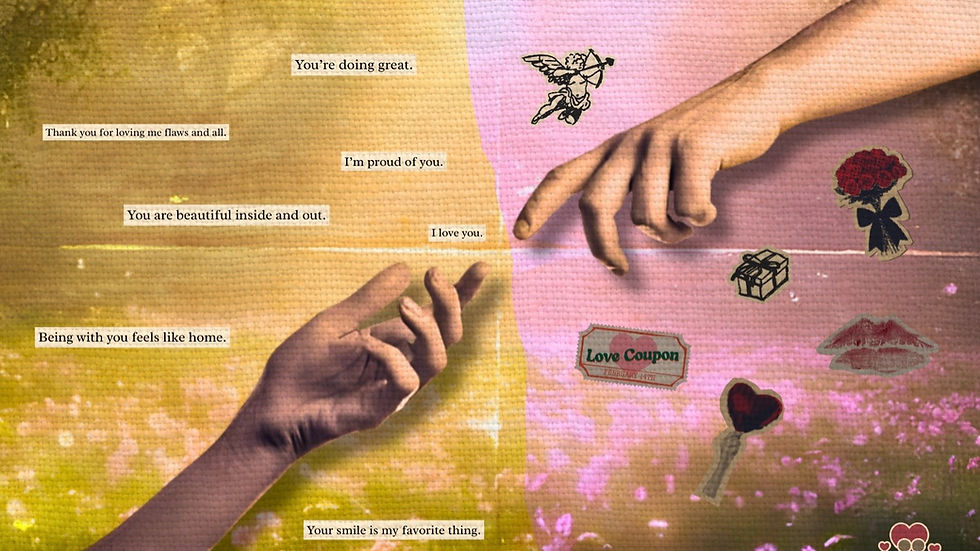My Body, My Choice, My Rights?
- The Communicator
- Mar 22, 2025
- 4 min read
Updated: Mar 24, 2025
Treading the lines from sexual preparation to post-coital anxieties, how do we alight the ride that boards for a safe space where women feel secure enough to be curious, safe, and truly empowered?
“I don’t know who to ask, where to reach out.”

Online anonymous platforms like group chats and encrypted applications cater to a myriad of “taboo” questions from women who feel too shy to ask.
However, breaking through the shame wall, where can women actually find access to a space that encourages an open discourse of information about one’s body, preferences, and options?
Safe sex, a must-know and must-learn
In our culture, we often run to a trusted Ate when we have questions about the female body.
As we grow older and come of age, we realize how quickly we turn into the Ate's we used to look up to but no matter how hard we try to think and remember, there really is not much to recall about safe sex, but one must not fret. Luckily, a will to know and an open-mind to relearn negatively-instilled and perpetuated stereotypes are enough to fuel a curious girl to find the right answers.
In Kimberly Holland’s “A Woman’s Guide to Safe Sex Basics,” practicing safe sex involves research, knowing oneself, and using protection. “Being proactive about this talk helps prevent heat-of-the-moment decisions that can lead to long-term regrets.”
While we may conduct our own research, sometimes, our trust should take the foundation on the right avenue where answers can truly be secure.
Research on birth control plans can be done safely through open organizations promoting safe reproductive health in the country, like tbe Likhaan Center for Women's Health Inc. where assistance in knowing the right contraceptive method can be assured alongside consultations they offer like reproductive health and family planning consultations.
Moreso, as a woman, deciding on one’s personal endeavors should be a personal decision weaved from one’s own free will and not from mere pressure or disregarded consent. Safe sex is a healthy choice partnered with knowledge on contraceptives, kindred roots on comfortability, and keen consent.
Support from around and within
While well-geared preparation is a wise decision, finding oneself asking the questions of “why,” “what,” and many more after engaging is not something to be ashamed of. As we learn about our bodies, we open the door to “awkward” but important dialogues.
Alarmingly, women find solace in anonymous chat boxes to raise questions on situations that bring doubt on whether their experiences were unsafe or would lead to pregnancy or sexually transmitted infections (STIs).
Some find humor even playfully tagging their friends when women resort to posting anonymously in pages and groups like university Facebook groups asking pre- or post-sexual questions; but circling back to the fact that when the only safe place a woman feels comfortable to bare such questions is a social media group, how dire can the consequences be when they pick just any suggestion or tip from a fishbowl of strangers’ opinions?
While a clamor of support and answers will likely swarm from fellow women as well, this might only invite a pool of varying advice from either untested or unapplicable suggestions, if not entirely dangerous.
Different clashing voices on what is safe and what should drive one mad overthinking—suggestions vary from peer-suggested contraceptives, calendar method, and even do-it-yourself abortion.
Penned by Clara Padilla from EnGendeRights Inc., back in 2012, among the 610,000 Filipino women who induced abortion, 100,000 were hospitalized, and 1,000 died from unsafe abortion complications.
Beyond the enactment of the Responsible Parenthood and Reproductive Health (RPRH) Act of 2012 or RH Law, women organizations and movements are still geared to strengthen the support that protects the sexual health and welfare of women by advancing beyond reproductive health education and access to contraceptives and seminars.
Knowing about safe sex includes consideration of women’s health and preparedness, which refocuses the spotlight to the need for a more comprehensive and considerate framing on how laws should give women choices on the exercise of their reproductive rights.
Standing up for informed choices
Practicing safe sex is a shared responsibility of eradicating the room for unforeseen risks and consequences. Thus, it is enlightening to know that while sex in the Philippines is unfortunately demonized instead of well-explained, we still have ways of knowing how to practice it safely and where to access the information we need.
As young women, conversations about one’s body come through quieted down talks hushed by an ill-structured inkling to “feeling embarrassed.” Talking about sex is traced only to the statistics of teenage pregnancy in the country but in a deeper sense, it covers more than that.
Like in Antoinette Jadaone’s “Sunshine” starring Maris Racal’s role as a pregnant teenager who succumbs to navigating difficult decisions including abortion which is illegal in the country, it is often the girl who has to live through the consequences of a society that shames and restricts a woman’s liberty.
Learning about sex as a girl or woman, in a society that manipulates the uninformed, is a power we can wield not only in conversations that tackle us but also laws, programs, and movements that include one’s voice and are supposedly dolled in place to protect women’s welfare, reproductive and human rights included.
Nevertheless, until we establish a sharper needle that will sew the absolute protection and consideration of women’s reproductive health and choices, merely making informed choices may be a blunt pushpin we would have to keep pressing on.
Article: Sharona Nicole Semilla
Graphics: Kent Bicol




Comments